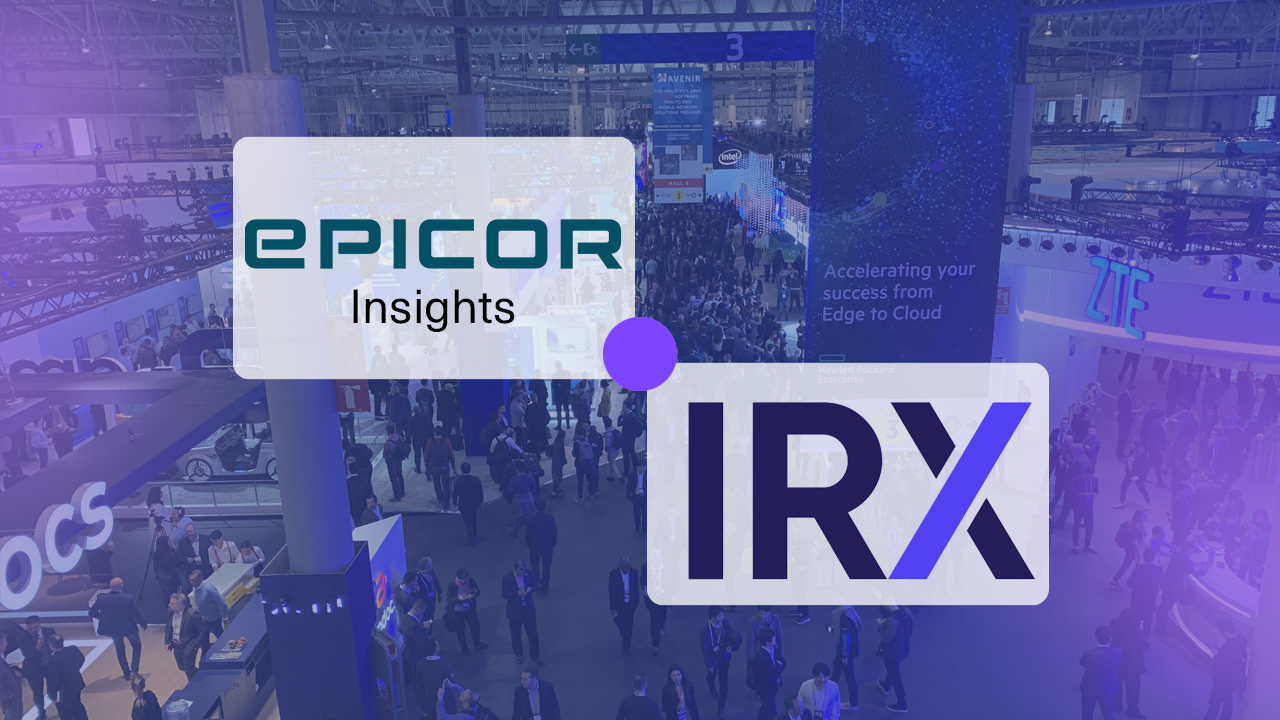eCommerce businesses face challenges like managing inventory, maintaining website speed, and providing a great customer experience. Choosing the right ecommerce platform for your business is essential, as a wrong choice can hurt your performance and growth in the long term.
Magento ecommerce helps solve these problems with its flexible, scalable, and secure features. It also offers the tools businesses need to grow their online stores.
In this blog, we’ll explore why Magento can be the perfect solution for your business, including its key features, benefits, and drawbacks to consider.
ON THIS PAGE
Understanding Magento 2
Magento 2 is the latest and most updated version of the platform that offers major improvements in speed, security, and scalability. Released to address speed, security, and performance issues, Magento 2 brings several benefits that make it an ideal choice for businesses of all sizes. Some of the key improvements of Magento 2 include:
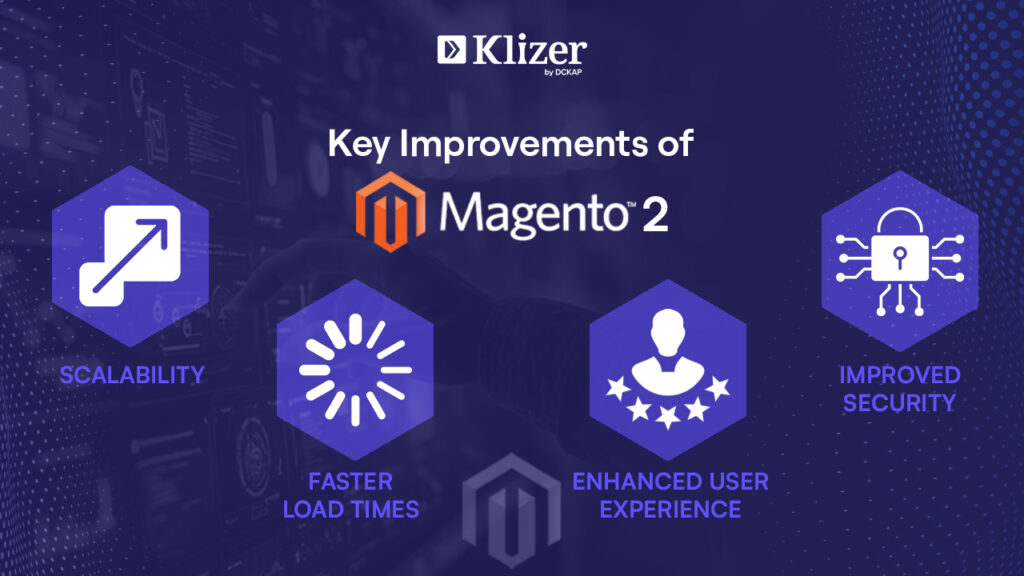
- Faster Load Times: Magento 2 provides up to 50% quicker load times, ensuring that your ecommerce website performs optimally even with heavy traffic.
- Enhanced User Experience: The user interface and checkout process are significantly improved in Magento 2, which makes it easier for customers to navigate and complete their purchases.
- Improved Security: Magento 2 comes with better security features, such as enhanced payment security and advanced data protection.
- Scalability: Magento 2 is built to handle the growth of your online store, with the ability to scale as your business expands and your customer base increases.
Learn more about: Magento 2 Box Price Calculator
What Are the Three Main Editions of Magento eCommerce?
| Over 130,000 live Magento sites and more than 500,000 businesses have trusted Magento for their online success. |
Magento provides three main editions such as Magento Open Source, Magento Commerce, and Magento Commerce Cloud. Each of these editions is designed to meet different business needs.
| Magento Edition | Description | Best For |
| Magento Open Source (formerly Magento Community Edition) | The free, open-source version of Magento that allows for full customization.It requires technical expertise to build and add custom features. | Small to medium-sized businesses with in-house developers or the ability to hire technical expertise. |
| Magento Commerce (formerly Magento Enterprise Edition) | Paid version with additional features like enhanced security, customer segmentation tools, targeted promotions, and extensive customer support. | Larger businesses with complex requirements need a robust, feature-rich ecommerce solution. |
| Magento Commerce Cloud | Managed, a cloud-based version of Magento Commerce with added scalability, performance optimization, and built-in cloud infrastructure. | Enterprise-level businesses seeking a high-performance, fully managed platform. |
Recommended Read: Magento Performance Optimization
Let’s Have a Look at Some of the Magento [Adobe Commerce] Features.
After Adobe acquired Magento in 2018, the platform became an even more powerful ecommerce platform. They integrated Adobe’s advanced features to enhance its ecommerce capabilities.
Magento’s integration with Adobe Commerce provides several benefits and they are given below.
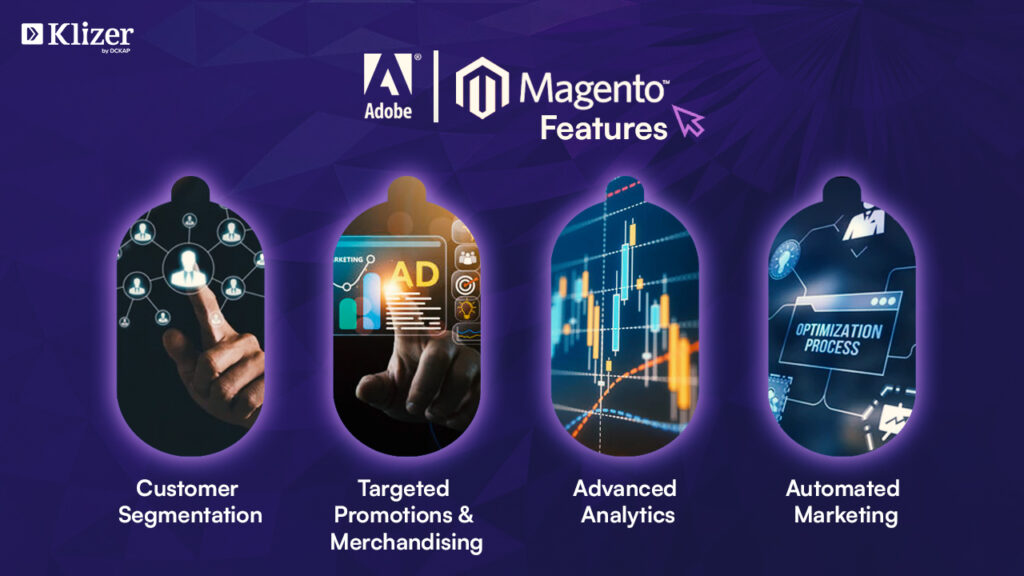
Customer Segmentation: Magento allows merchants to segment customers based on their behavior and preferences. This makes it easier for them to target specific audiences with personalized marketing campaigns.
Targeted Promotions & Merchandising: Magento enables store owners to create dynamic, targeted promotions and merchandising strategies that appeal to individual customers or customer segments.
Advanced Analytics: With Adobe’s powerful analytics tools, businesses can track customer behavior, sales performance, and more. This data can help them make informed decisions to optimize your store’s performance.
Automated Marketing: Adobe integration also brings powerful tools for automating email marketing campaigns, improving customer engagement, and encouraging repeat purchases.
Recommended Read: Magento Features: Open-Source & Commerce [Comparison + Benefits]
How Magento’s Pricing Has Been Structured?
Magento pricing is based on the edition and the annual gross sales revenue (GSR) of your store:
- Magento Open Source Edition is a free version.
- Magento Commerce (Adobe Commerce Edition) pricing starts at $22,000 for a GSR of $0–$1,000,000 and can go up to $125,000 for a GSR of $25,000,000–$50,000,000.
- Magento Commerce Cloud (Adobe Commerce Cloud) starts at $40,000 and can reach up to $190,000, depending on the GSR.
What Will You Get Using Magento eCommerce Platform?
There are several reasons why businesses should use the Magento platform and they are discussed below.
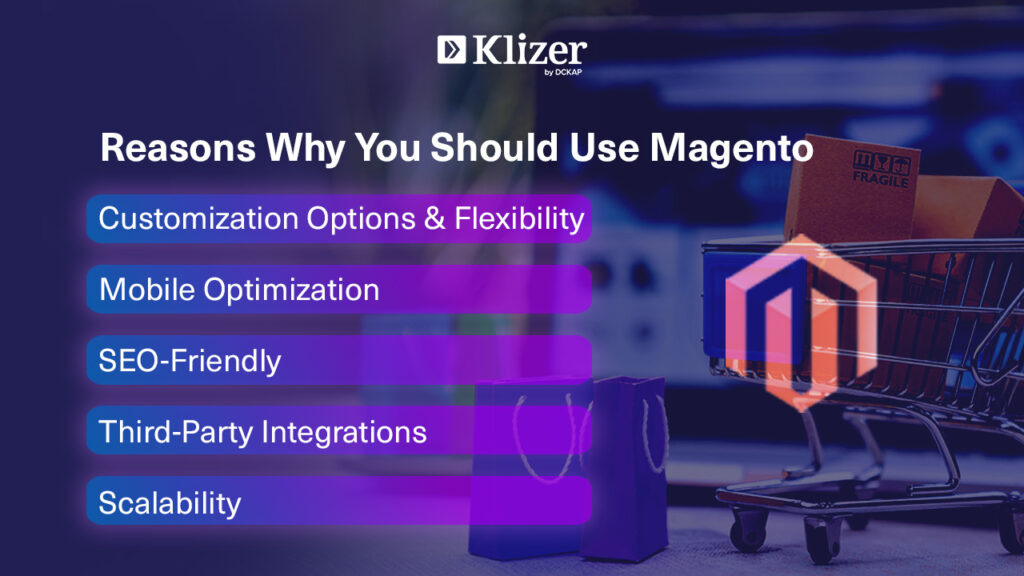
1. Customization Options & Flexibility: Magento is an open-source platform, so businesses can customize their stores to meet their specific needs. They can also integrate third-party tools or create a unique shopping experience.
2. Mobile Optimization: Magento makes sure your store works well on mobile devices. This provides a smooth shopping experience for customers on any device.
3. SEO-Friendly: Magento has built-in SEO features like search-friendly URLs, meta tags, and layered navigation. These help businesses improve their online presence on search engines and attract more visitors.
4. Third-Party Integrations: Businesses can easily integrate third-party add-ons into their Magento store. Magento also allows easy integration with tools like PayPal, Google Analytics, and Mailchimp. This helps improve your business operations and marketing strategies.
5. Scalability: Magento grows with your business. It can handle more traffic and large product catalogs as your business expands.
Top 3 Examples of Magento eCommerce Websites
1. Land Rover

Land Rover is a famous brand that makes SUVs and off-road vehicles. Their website sells cars and also offers lifestyle products like clothing, scale models, and accessories that match the spirit of their vehicle brands: Range Rover, Defender, and Discovery.
Magento helps Land Rover run its online store smoothly. It allows them to show different content based on where customers are located, which makes the shopping experience more personal. The website is easy to use on phones, and it even lets people book test drives online. Magento also helps Land Rover manage sales to both regular customers and businesses, all from one platform.
2. Helly Hansen

Helly Hansen is a brand known for technical clothing and sports gear and uses Adobe Commerce to manage over 55 global websites. The platform helps them handle different languages, taxes, and shipping rules seamlessly.
Magento allows Helly Hansen to personalize the shopping experience based on customer behavior. It supports a large inventory of over 35,000 products and integrates with Adobe Experience Manager to manage content and loyalty programs. The website is also designed to be mobile-friendly for easy shopping on any device.
3. T-Mobile

T-Mobile is the third-largest mobile network operator in the US, with over 117.9 million subscribers and more than 20,100 retail locations. It offers a variety of services, including wireless products, TV, Internet, and banking. To manage its large and complex business, T-Mobile relies on Magento.
Magento’s ecommerce platform helps T-Mobile create a seamless online shopping experience for both consumers and businesses. It supports personalized customer journeys, which makes it easier for customers to find and purchase the right products. The platform also provides a simple checkout process and ensures a consistent brand experience across all of T-Mobile’s services, including T-Mobile MONEY. Magento’s tools help T-Mobile optimize its website and improve marketing efficiency, boosting productivity by 47%.
Pros Of Using Magento eCommerce Platform
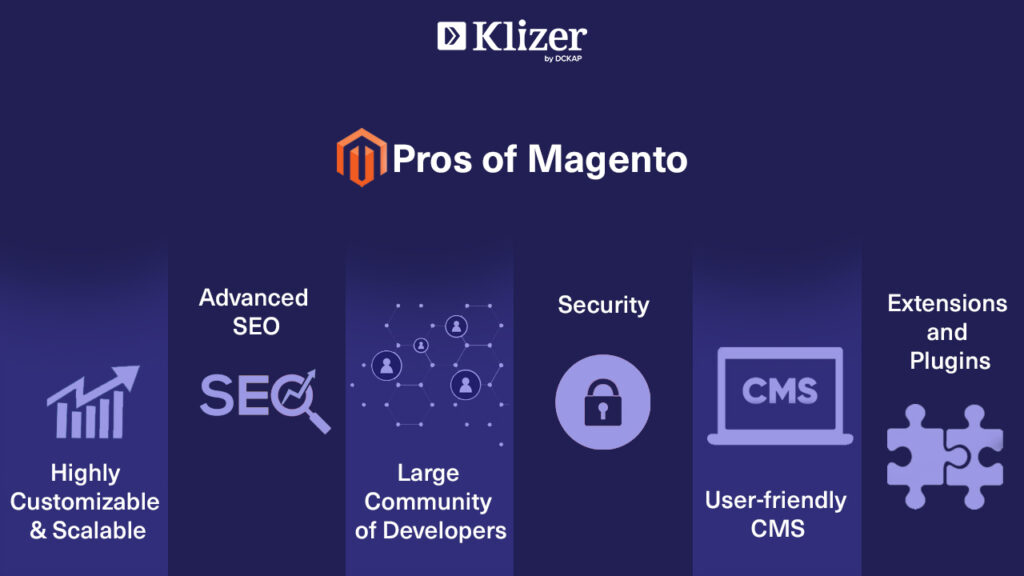
- Highly Customizable & Scalable: Magento can handle a large number of SKUs and is easily scalable to meet the unique needs of growing businesses.
- Advanced SEO: Magento offers robust SEO features to help improve visibility on search engines.
Large Community of Developers: Magento has a vast community of developers and professionals who can help businesses create custom solutions. - Security: Magento provides advanced security features to protect sensitive customer data.
Extensions and plugins: Magento offers numerous extensions and plugins that help businesses enhance the functionality of their online stores. - User-friendly CMS: Magento’s Content Management System (CMS) helps businesses easily create and manage their online store content. It allows users to build custom pages, blogs, product descriptions, and promotional content without needing extensive coding knowledge.
Cons of Using Magento eCommerce Platform
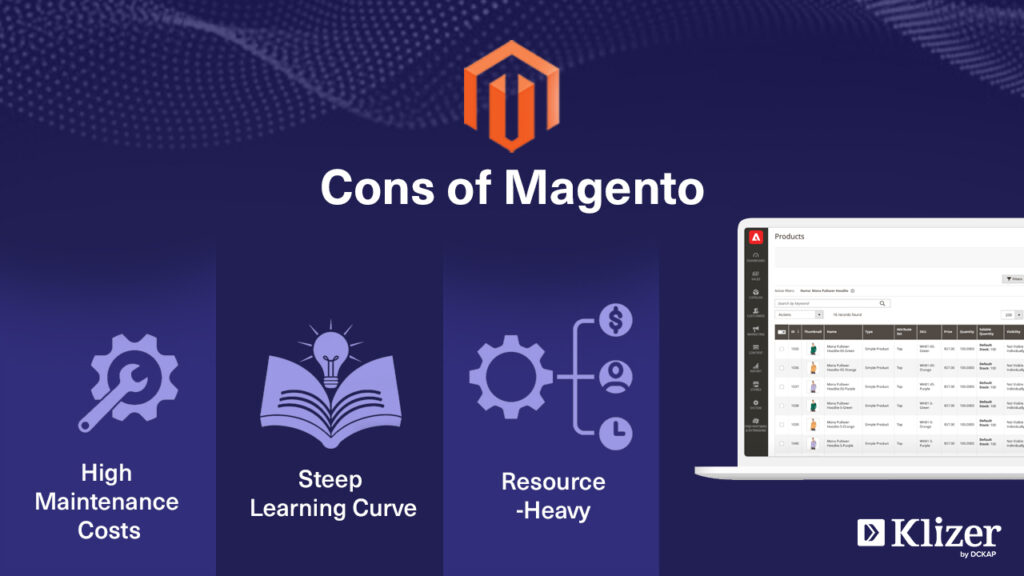
- High Maintenance Costs: Magento requires ongoing maintenance, especially for larger stores, which can add to costs.
- Steep Learning Curve: The platform has a steep learning curve, which means that businesses without technical expertise may need professional help.
- Resource-Heavy: Magento requires powerful hosting, such as VPS or dedicated servers, to run smoothly, making it more resource-intensive than other platforms.
Implementing Magento for Your eCommerce Business With Klizer
Magento ecommerce helps businesses by offering a highly scalable platform that can handle large amounts of traffic and vast product catalogs. It also provides robust security features to protect customer data and integrates easily with third-party tools like payment gateways and analytics. This makes it easier for businesses to grow, adapt, and meet customer needs while offering a secure and smooth shopping experience to their customers.
If you want to build your ecommerce platform, you should hire an expert Magento development agency like Kizer.
At Klizer, our expert Magento development team can provide Magento development solutions. They understand what businesses need and help them build their Magento ecommerce platform.
Contact us today for more information!



